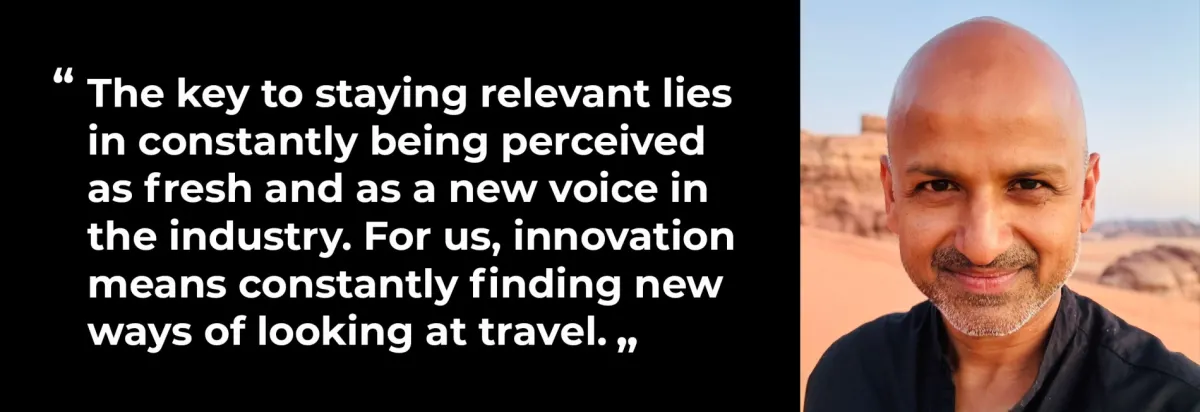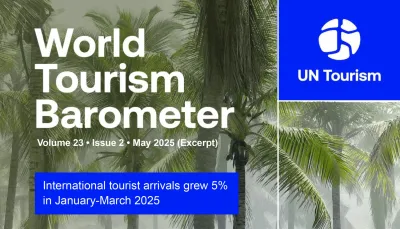Skift founder travel media
Skift Global Forum innovation
Travel industry data insights
Life tourism trend
Sustainable travel media
Travel industry thought leaders
Group travel digital transformation
AI in travel booking
Future of travel media
Rafat Ali: The Visionary Shaping the Future of Travel Media

Skift founder travel media
Skift Global Forum innovation
Travel industry data insights
Life tourism trend
Sustainable travel media
Travel industry thought leaders
Group travel digital transformation
AI in travel booking
Future of travel media
Rafat Ali, a transformative figure in digital media, is best known for founding Skift—a leading intelligence platform in the travel industry.
His journey began in India where he studied Computer Engineering, and took a defining turn when he pursued a Master’s Degree in Journalism at Indiana University. This unique blend of engineering precision and storytelling laid the foundation for his future success.
Rafat’s first major achievement came with PaidContent, a site launched in 2002 that focused on the business of digital content. Its success as a go-to resource for media professionals navigating the evolving digital landscape led to its acquisition by Guardian News & Media for $30 million in 2008. Following the acquisition, Rafat continued advising media companies, establishing himself as an influential figure in digital media.
In 2012, Rafat Ali co-founded Skift with the goal of delivering in-depth business insights to the travel sector during a time of rapid industry transformation. Skift quickly grew into one of the most influential platforms for intelligence, data analysis, trend forecasting, and signature events such as the Skift Global Forum. Rafat’s business philosophy—focused on sustainable growth rather than quick financial gains—shaped Skift into a company that was built to last. His approach aligns with the philosophy of new-generation venture capital firms, like BAE Ventures, which by specializing solely in the travel and tourism value chain shares the belief that businesses should be built for long-term success, not just immediate wins.
Beyond Skift, Rafat has extended his influence through his work with organizations including the International Women's Media Foundation and the Media Development Investment Fund. His commitment to independent journalism and fostering media innovation speaks to a deep-seated belief in responsible, sustainable growth. He doesn’t just follow trends—he creates them.
Rafat’s life outside the boardroom is just as full. He often describes himself as a “perpetually exhausted dad” of two energetic boys, a personal touch that makes his professional achievements even more remarkable. Balancing family life with the demands of being a global media leader, he remains grounded in his values of long-term vision and responsible leadership.
As the travel industry navigates the post-pandemic world, Rafat’s insights and Skift’s role in shaping its future have never been more crucial. His focus on the future of travel—what he calls "trendlines, not headlines"—positions him as a thought leader for an industry in constant flux. Rafat Ali's journey from a computer engineer turned journalist to a global media influencer is a testament to his visionary thinking, relentless work ethic, and dedication to shaping not only the future of travel media but the industry as a whole.
To gain deeper insights into his views on the evolving travel landscape, we asked Rafat Ali a series of questions about the trends, challenges, and opportunities shaping the industry's future. Here's what he had to say:
When you founded Skift, what led you to focus on the travel industry?
After selling my first company, I took two years to travel and reflect. Initially, I planned to start a consumer travel startup. I was trying to figure out what would the next iteration of travel guidebooks be on a touch-based platform like an iPad. While learning about the industry, I tried to read the existing trade media and realized how poor it was. With my background in B2B media and information, I saw an opportunity. I decided to focus on creating a B2B information business—essentially the Bloomberg of travel, which didn’t exist at the time. This was the genesis of Skift, and now, 12 years in, I would humbly say we’re well on our way.
What unique challenges have you faced in maintaining relevance within a constantly evolving industry like travel?
I believe the key to staying relevant lies in constantly being perceived as fresh and as a new voice in the industry. Over the past 12 years, people have often said that about us, and it's something we've internalized as a team. For us, innovation means constantly finding new ways of looking at travel. This is why we frequently introduce new concepts: “over tourism”, “hate selling”, “perma-anxiety”, “life tourism”, the latter of which I've been talking about recently. While some of these may sound gimmicky, they keep the excitement alive.
Last year, we introduced version 2.0 of Ask Skift, our AI chatbot that answers a lot of travel industry questions. We're now calling it the "answer engine." We’ve also introduced new conferences. We continually explore innovative ways to present our content, including new design approaches. We're very particular about our color schemes and conference details, including the selection of music for our events. All of this is about keeping things fresh and exciting in an industry that is surely one of the most exciting industries in the world—after all, how can travel not be exciting?
When it comes to challenges, my main focus is ensuring that our team stays energized and inspired and doesn’t get overwhelmed by all we’re doing. I often refer to myself as the "Chief Energy Officer," making sure that the enthusiasm starts with me and spreads throughout the team. In return, their passion fuels me as well, creating a dynamic, positive cycle that keeps us all motivated and moving ahead.
How can travel companies better harness data-driven insights to innovate in both customer experience and operational efficiency?
That’s a tough question with no easy answer. Most companies struggle with using data effectively. For example, many have loyalty programs but lack a true understanding of how to treat repeat customers. These programs are often more about driving transactions than genuinely enhancing the customer experience.
I hope that, because getting insights out of data is such a non-trivial challenge, AI will play a key role in simplifying this process. Right now, much of the effort is bogged down by the need to clean up data, which is where many travel companies get stuck. Travel generates vast amounts of data from airlines, hotels, online platforms, and more. The real potential lies in AI's ability to make querying this data simple—so simple that companies won't need specialized expertise to do it. If AI can evolve to make data as easy to work with as email, we could finally see these insights being used to their full potential. That's where I hope to see these tools become a reality. Ideally, this represents the 'nirvana' we’re striving for.
You’ve often spoken about focusing on 'trendlines, not headlines.' How has this approach shaped Skift’s long-term strategy, and why do you believe it’s essential for navigating the travel industry’s future?
Because sometimes headlines give you a wrong sense of what the long-term trends are. Long-term trends in travel show a secular increase in the number of travellers, which is generally a force for good and a powerful economic engine that drives the world. Headlines—especially in mainstream media—tend to focus on mishaps, whether it's airlines, cruise lines, or issues with companies like Airbnb, which can mask the reality of both, where the travel industry is going, and where the world is going. That’s why I emphasized focusing on trendlines—connecting the dots across long-term arcs of history and looking into the future—rather than rolling from one headline to another. That's what we try to implement at Skift. That's also what we try to do when looking at the world of travel.
BAE Ventures is actively exploring the growing demand for shared live experiences, such as festivals, cultural gatherings, and immersive events, something you recently referred to as "Life Tourism." How do you see this trend shaping the future of travel, and what opportunities does it present for businesses wanting to capitalize on it?
I'm just so fascinated by a world where polarization is increasing, loneliness is on the rise, and demographic changes are leading to diminished community connections across all Western and Eastern societies. Live tourism—whether it's sports, music, entertainment, or natural events like a solar eclipse—brings people together in ways that no other medium can. With the decline of mass media, these shared experiences are even more significant.
Live tourism is important because it builds community, drives development in cities, regions, and countries, and allows people to follow their passions while meeting new people. It also supports intergenerational travel, where families or friends can connect across different geographies. That’s why I think live tourism is so important and why it requires a focused effort, and it’s why we see cities like Las Vegas, countries like Saudi Arabia, and even the US now working to attract more sports events to their regions.
With increasing consolidation among major players in the industry, there seems to be a growing imbalance between large corporations and smaller businesses. What do you see as the limits or risks of this consolidation, and how can smaller players remain competitive in such an environment?
This is definitely true in the airline industry. Take the current state of the industry in the US as an example. In off-the-record conversations, many airline professionals admit that they dislike dealing with customers. The industry often focuses more on numbers and operations rather than on providing a positive customer experience. A lot of this comes from the control these companies have over passengers, routes, slots, and so on.
It’s also true in the hotel industry, where big companies are swallowing up the independents, which is where a lot of the energy and creativity in hotels come from. And it’s clearlytrue in online travel, where size really matters. That’s why it’s so important to have a vibrant startup ecosystem in all these areas, and funds like yours are helping keep that alive.
Tech advances will hopefully allow smaller companies to leap ahead of the big players, and innovation usually comes from the edges—from people outside the travel industry coming into it. Travel is often the testing ground for new tech. So, this dynamic between big and small businesses will keep playing out. Big companies usually end up acquiring smaller ones, but the energy and innovation almost always come from the edges or from small companies.
What do you believe is the next big—yet untapped—factor, market, trend or innovation, that will significantly shape the future of the travel industry?
I think group travel is a big one. It might sound ridiculous, but tour operators, which have been around forever, are one of the last sectors to undergo significant digital transformation and be widely sold online. Group travel is something people are increasingly seeking because it aligns with many of the trends we’re seeing in the world today. I believe there’s still a huge opportunity in this area that hasn’t been fully realized.
Another major factor is the live tourism ecosystem and making it seamless. This ties into the connected trip idea that platforms like Booking.com have been talking about for a while. Seamless travel has always been a goal, and it’s particularly important in the live tourism space.
Interestingly, I don’t think AI itself is the next big thing—rather, it’s an enabler, an underlying tool. AI will eventually change how we book travel and other services in the near future. For nearly a decade, I’ve talked about the need to disrupt the outdated “tyranny of the search box" that has dominated travel booking for over twenty years. This system is overdue for a change. I’m also a strong believer in the potential of voice agents and their role in business, especially in travel, where they could be incredibly useful.
Leading the Sustainable Future of Travel Media
Rafat Ali continues to push the boundaries of travel media, extending his influence far beyond the platforms he’s built. As a catalyst for change and industry innovation, his long-term strategies offer a blueprint for the future of travel, where technology, data, and community experiences intersect. As the travel industry evolves, leaders like Rafat will ensure its transformation is both relevant and sustainable for generations to come.



